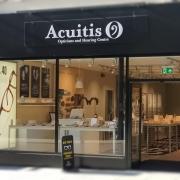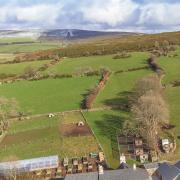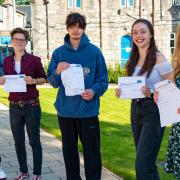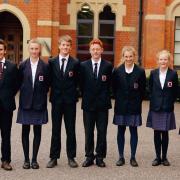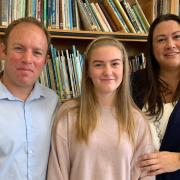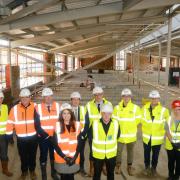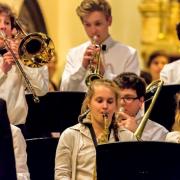Catherine Knight shows Anna Turns around Nethercott Farm, a place where children can get their hands dirty.
Tucked away in deepest rural Devon, Nethercott Farm is a world away from blocks of flats and the buzz of city life. Catherine Knight, a trained teacher, has worked as Nethercott’s school manager for over five years, and her passion for the cause continues to shine through. Nethercott Farm was the first of three residential farms for school children around England and Wales to be established as part of the charity Farms 4 City Children.
Catherine strongly believes that learning outside of the classroom can often be a powerful experience and one that leaves a lasting impression. The ethos of learning by doing, rather than being told something, runs throughout the week-long residential courses. Teamwork comes into play, from sweeping the courtyard together to helping cook vegetables grown in the large walled kitchen garden, with everyone mucking in. “It’s a great leveller,” says Catherine.
As we walk around the grounds of the farm, located near the North Devon village of Iddesleigh, Catherine explains that it is often the simple differences that have the biggest impact on the children. For example, it can take a while for their eyes to adjust to night vision on early morning shifts at the milking parlour. To some, it might seem strange to be away from the amber glow of street lighting, with the peaceful sounds of the countryside a dramatic contrast to the constant drum of traffic in the city.
“The children always leave with bright and rosy cheeks after living here for a week”
Often simple lessons might get lost in the complexities of today’s National Curriculum, so Nethercott takes children back to basics for a week. For example, using the Forest School ethos, it demonstrates how milk is sourced from cows and not just in bottles from the supermarket.
The children become an integral part of the farm’s routine for the week. “The children always leave with bright and rosy cheeks after living here for a week,” says Catherine, who is a strong advocate of kids enjoying an active outdoor lifestyle and eating local fresh and seasonal produce.Children leave their computer games at home, and without television they are left to their own devices to amuse themselves in the evenings. “It’s charming to see some of the children playing together and sewing, knitting or writing in their diaries to pass the time,” says Catherine as we walk through the large Victorian manor house to the classroom in the attic conversion. Evidence of creativity from each school group is imprinted onto the building. Everywhere you look there are handmade felt sheep hanging from the ceiling, collages and pictures, and sculptures of chickens adorning the bookshelves.
Many school groups have also contributed something more permanent to Nethercott. The charity often invites local artists to teach the students and the staff how to use traditional methods. Some are weaving willow structures in the spinney, others help make the cobb roundhouse which will eventually be used as an outdoor classroom. “They love it because it’s just like working with mud pies!” says Catherine, who is also very conscious of her duty to pass on knowledge about rural crafts and trades. History lessons plays a big part too, with locals often visiting to talk to the children. One lady now in her eighties first worked as a maid in the farmhouse and still returns to Nethercott to help build up a picture in the children’s minds of what life was like in those days. She is quizzed with: “What did you eat then?” and “How much were you paid?” in a way that only children can ask.
“What better classroom to learn in,” says Catherine as we look at the view from one of the dorm windows of the grounds, across the fields towards Dartmoor. “It’s great hearing the sound of children’s laughter all over the place – that is how it should be.” And that is how the children’s author Michael Morpurgo envisioned it when he and his wife, Clare, first set up this charity in 1976.
Historically, there is a long-standing tradition of involving two local farmers in the running of Nethercott. Helen Chaloner, who works for the charity, explains: “Graham Ward keeps an organic dairy herd at Parsonage Farm and his brother, David Ward, keeps beef cattle and sheep at Bridgetown Farm. Their family’s partnership goes right back to the founding of the charity 34 years ago and it works for us and for them. For example, Graham raises the calves but some are on our site where kids can help feed them safely.”
Today, over half the schools that visit Nethercott Farm come from London, and about 80% of the groups are from revisiting schools. Occasionally one or two kids resist but normally after a couple of days in this new environment they have all grasped the bull by the horns and got stuck in, and it’s easy to see how children do absorb so much more in this interactive environment.
Above all, it is the people behind the Farms for City Children charity that make this place work. “This is a place I totally believe in,” says Catherine, who sees a real transformation in the children. Some have never left the concrete jungle or seen a real cow before they arrive at Nethercott, and it certainly is a place where magic can happen.
WHAT’S ON
10 December Christmas Fair A family fun craft fair with mulled wine and mince pies, carol-singing, prize draw and children’s games. 6pm-8pm. Nethercott House, near Iddesleigh, EX19 8BG. farms4citychildren.co.uk
(PLEASE NOTE CHANGE OF DATE SINCE MAGAZINE WENT TO PRINT! CHRISTMAS FAIR IS ON THE 10TH NOT THE 17TH DECEMBER)



